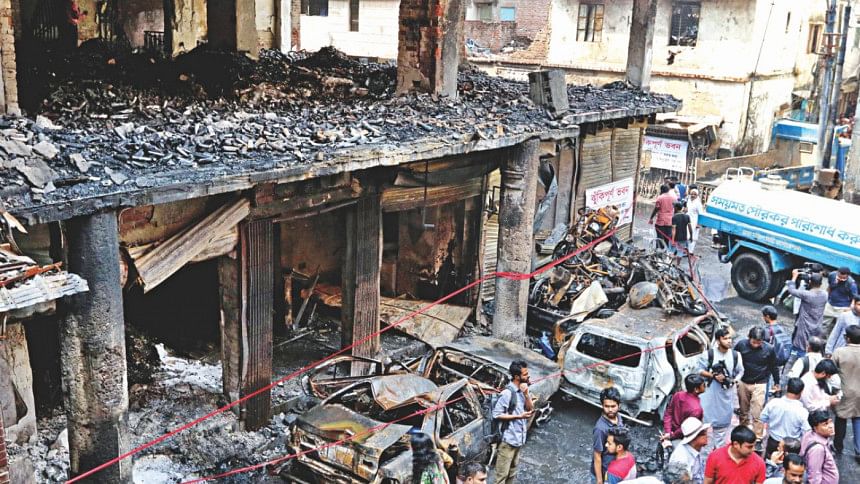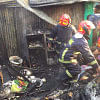Of mortality and unlearned lessons

If you Google "Tragedies in Bangladesh," you will see a multitude of news articles popping up about disastrous mishaps where factories have collapsed, burned, or had a major industrial machinery explode, and claimed the lives of tens to hundreds to thousands of workers and passers-by who were unfortunate enough to be around the area of disaster. And many of these are just the ones in Dhaka city.
Including the recent chemical warehouse disaster in Chawkbazar on February 20, there are many disasters that we can recall like the deadly collapse of Rana Plaza in Savar (2013), Nimtoli fire that began with the explosion of an electrical transformer (2010), Tazreen Fashion factory fire in Ashulia (2012), a fire in a factory that made clothes for Gap (2010), Korail slum fire in Mohakhali (2018), and so on.
Articles have been penned on other such disasters which have not named many incidents because either the death toll was not high enough, or the disaster was not associated with a well-known company—with titles such as "Boiler Explosion" or "Packaging Factory Fire". Let's not forget that there are numerous unrecorded fire incidents in the slums of Dhaka city.
Since the Chawkbazar incident is just a few days old, let's talk about this latest disaster in greater detail, without delving into the gruesome aspects. It is claimed that the fire started due to the explosion of a gas cylinder in a vehicle. The fire from the gas cylinder was easily allowed to spread into a nearby chemical factory, and the fire later transformed into a deadly blaze, engulfing other buildings including a community centre nearby. It should be made clear though that there remains some confusion regarding the presence of a CNG cylinder as some witnesses have claimed that the pick-up's CNG cylinder sparked the fire while others have claimed that an LPG cylinder at a restaurant near Hazi Wahed Mansion triggered the fire. The chief inspector at the Department of Explosives told this daily that they had not found any sign of a cylinder blast.
For the sake of argument, let's say that the so-called CNG cylinder was indeed responsible for sparking the fire. And the reason I said that the fire was "allowed" to spread is because in this case the fire from the CNG cylinder outside the building easily reached the flammable chemicals of a warehouse—and this is a tragedy in itself.
The worst part is that this is not the only major fire incident to have happened in Old Dhaka. The last major fire-related incident occurred in 2010. Nine years is plenty of time for authorities to at least start implementing some initiatives and enforce better urban planning. Isn't it? But we didn't see any of that. At least 123 people died in the previous fire incident in 2010, and at least 67 people have reportedly been killed in the recent fire in Old Dhaka.
Dhaka South City Corporation Mayor Sayeed Khokon has also been reported to have said that no chemical warehouses will be allowed inside Dhaka. This might cause increased transportation costs for businesses concerned. Instead of banning them completely from Dhaka, why not include regulatory laws that delineate how and where the chemicals should be stored, how flammable chemicals should be handled, etc.? Banning them outright from the city is not realistic either. This is like the idiom where you chop off the head to cure a headache. Banishment is not the answer in this case.
The only tragedy that I can think of that brought some major and visible changes to planning and regulation of (garment) factories is the Rana Plaza incident back in 2013. And that's only because it brought international criticism and boycotts of Bangladeshi garments from around the world. The steep death toll of at least 1,134 and haunting images of the incident shook the world. It was only after the deaths of so many workers that people began raising their voices against exploitation of garment workers and flagrant violation of laws in the industry.
But why is it that only after lives are lost, we starting thinking about the need to do better with our urban planning, construction and safety standards? We can point fingers at many and shift the entire blame on to them. The factories can be blamed for not complying with safety standards and for trying to keep labour costs as minimal as possible; foreign buyers can be blamed for paying dismally low prices for industrially produced export materials making factories unable to "afford" safety regulations and better working standards for workers; government agencies can be blamed for not being strict about enforcement of safety standards, and for not trying hard enough to improve living standards of people in slum areas or to give incentives to factory owners so that they can provide better remuneration and benefits to their workers; and even the ordinary citizen can be blamed for not raising their voice demanding change before so many lives were lost.
However, pointing fingers and blaming one another will not get us anywhere. We call the disasters "tragedies", but in reality, in light of how the situations are handled, it seems that all we do is pay heed to the statistics of death tolls and disasters that continue to take place. The bigger the number of people killed in the disaster, the more we seem to "care".
Apart from the times when tragedies strike, do we seem to care about what we need in this city? We need better urban planning, we need better equipment for our firefighters, and we need stricter enforcement of laws and regulations along with the assurance that those laws cannot be misused against the innocent.
Condolences mean nothing to the dead, and compensations will not bring the lost souls back. Do we have to wait for another disaster of the scale of Rana Plaza until any of our needs are met? Will we ever learn? Can we at least bring down the number and frequency of man-made casualties due to shoddy architecture and urban planning, poor handling of flammable materials and industrial products, and usage of old and/or faulty industrial machinery?
Araf Momen Aka is an undergraduate student of Jahangirnagar University and a contributor to SHOUT, The Daily Star. Email: [email protected]









Comments